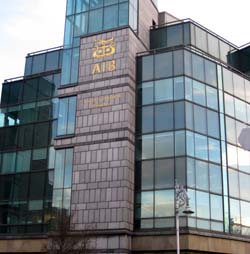 Flying into Ireland the day after Christmas, two questions were on my mind: Where’s the nearest pub, and what will another country’s recession look like to an American who has the benefit of hindsight?
Flying into Ireland the day after Christmas, two questions were on my mind: Where’s the nearest pub, and what will another country’s recession look like to an American who has the benefit of hindsight?
Both questions were answered … quickly.
And circumstances that were eerily similar to the U.S. recession weren’t hard to spot.
Speculative real estate developments gone bust? Check.
Foreclosures? Check.
Government funded bailouts of the country’s largest banks? Check.
It turns out that the Irish have the same penchant for suburban real estate and overpriced urban apartments and the same drive to cash in on unnaturally inflating levels of home equity as any American.
 I interviewed a manager of a Northern Ireland branch of AIB, the country’s second largest bank, which after a bailout will soon likely be more than 90 percent owned by the government.
I interviewed a manager of a Northern Ireland branch of AIB, the country’s second largest bank, which after a bailout will soon likely be more than 90 percent owned by the government.
The bank manager talked about how property values in Ireland, at the peak of this country’s real estate boom, were ballooning 12 to 25 percent a year.
The Irish, the bank manager said, were flipping houses and riding the home equity wave just like Americans once did. Mortgage rates adjusted, and borrowers who could afford the initial payment on interest-only loans found themselves unable to make the new higher payments
Foreclosures set in, and Irish banks were left with loan portfolios swelling with bad assets worth less than what was owed.
Ireland is a year or two behind the United States in falling into and hopefully managing its way out of a recession.
What adds to the complexity of the banking problems here is how divided Ireland still is in many respects. Northern Ireland, which still seems to live on edge in some places because of tensions between Catholics and Protestants, still uses the British pound as currency.
But the South, which is on the Euro, is where most of the country’s big banks are headquartered, even those that do business in the North.
Yet despite it all, just as was the case in America, most people are going about their lives, business as usual.
The airport bustle. The buses going between North and South are packed with people. And just like in America during the recession, stores, restaurants and all the main commerce areas are jam-packed.
But there are for rent and for lease signs everywhere here, including in the main commercial areas. Signs for prime warehouse space, factory space and corporate headquarters space. (In Ireland, they say “for let” instead for lease.)
A postcard in a tourist shop defiantly says “What recession?”
So it turns out that the greed that fueled the recession — the one we all thought was American greed — seems to have been present elsewhere in the world.
And what hammered that point home more than anything in this misty land was when I heard the story of Titanic Quarter.
I met an accountant in his early 20s, the type of young professional that the developers of posh urban flats have told us will fill their new spaces. He told me the tale of Belfast’s link to the Titanic. The infamous ship was built in Belfast, and the city, as any enterprising municipality would, was looking for ways to use that historic link to anchor the mixed-used revitalization of an area of the city.
Long story short, just as deposits were being taken and construction was getting going, the Titanic Quarter hit its iceberg. The property boom went bust, and some of the projects there now aren’t worth what people initially paid for them.
Read a little more about that here.
The irony of that situation can’t be drowned out, even after too many pints of Guinness.
Michael Schwartz is a BizSense reporter. He was in Ireland on a fact-finding trip to learn more about how that country has fared during its real estate collapse.
 Flying into Ireland the day after Christmas, two questions were on my mind: Where’s the nearest pub, and what will another country’s recession look like to an American who has the benefit of hindsight?
Flying into Ireland the day after Christmas, two questions were on my mind: Where’s the nearest pub, and what will another country’s recession look like to an American who has the benefit of hindsight?
Both questions were answered … quickly.
And circumstances that were eerily similar to the U.S. recession weren’t hard to spot.
Speculative real estate developments gone bust? Check.
Foreclosures? Check.
Government funded bailouts of the country’s largest banks? Check.
It turns out that the Irish have the same penchant for suburban real estate and overpriced urban apartments and the same drive to cash in on unnaturally inflating levels of home equity as any American.
 I interviewed a manager of a Northern Ireland branch of AIB, the country’s second largest bank, which after a bailout will soon likely be more than 90 percent owned by the government.
I interviewed a manager of a Northern Ireland branch of AIB, the country’s second largest bank, which after a bailout will soon likely be more than 90 percent owned by the government.
The bank manager talked about how property values in Ireland, at the peak of this country’s real estate boom, were ballooning 12 to 25 percent a year.
The Irish, the bank manager said, were flipping houses and riding the home equity wave just like Americans once did. Mortgage rates adjusted, and borrowers who could afford the initial payment on interest-only loans found themselves unable to make the new higher payments
Foreclosures set in, and Irish banks were left with loan portfolios swelling with bad assets worth less than what was owed.
Ireland is a year or two behind the United States in falling into and hopefully managing its way out of a recession.
What adds to the complexity of the banking problems here is how divided Ireland still is in many respects. Northern Ireland, which still seems to live on edge in some places because of tensions between Catholics and Protestants, still uses the British pound as currency.
But the South, which is on the Euro, is where most of the country’s big banks are headquartered, even those that do business in the North.
Yet despite it all, just as was the case in America, most people are going about their lives, business as usual.
The airport bustle. The buses going between North and South are packed with people. And just like in America during the recession, stores, restaurants and all the main commerce areas are jam-packed.
But there are for rent and for lease signs everywhere here, including in the main commercial areas. Signs for prime warehouse space, factory space and corporate headquarters space. (In Ireland, they say “for let” instead for lease.)
A postcard in a tourist shop defiantly says “What recession?”
So it turns out that the greed that fueled the recession — the one we all thought was American greed — seems to have been present elsewhere in the world.
And what hammered that point home more than anything in this misty land was when I heard the story of Titanic Quarter.
I met an accountant in his early 20s, the type of young professional that the developers of posh urban flats have told us will fill their new spaces. He told me the tale of Belfast’s link to the Titanic. The infamous ship was built in Belfast, and the city, as any enterprising municipality would, was looking for ways to use that historic link to anchor the mixed-used revitalization of an area of the city.
Long story short, just as deposits were being taken and construction was getting going, the Titanic Quarter hit its iceberg. The property boom went bust, and some of the projects there now aren’t worth what people initially paid for them.
Read a little more about that here.
The irony of that situation can’t be drowned out, even after too many pints of Guinness.
Michael Schwartz is a BizSense reporter. He was in Ireland on a fact-finding trip to learn more about how that country has fared during its real estate collapse.
The Celtic Tiger roared for about a decade, first feeding on the raw meat thrown to it by the tech sector with call centers and software development $$. Then the Tiger put on a tux and started hangin’ with the big money. But most of that money, it turns out, was the fiscal equivalent of the emperor’s new clothes.
The US has exported a lot of great stuff over the last century or so, but our most recent global product, fiscal collapse under the weight of stinky credit default swaps and other “innovative derivatives.” American dream, indeed…
Urk. Insert “was” for last comma in 2nd graf above.
Thanks for the story, Michael. You should be able to write off every pint as a work related tax deduction.
Not many recall that in the earlier part of the 20th century, Ireland had it’s own revolution; and in so doing, it alienated it’s #1 trading partner (just like we yanks did) and it paid a dear price as a virtual 3rd world nation until it became the Celtic Tiger. After this appalling fall-out with little or no accountability, opportunity is again knocking – but now from across the Irish Sea and from continental Europe – and at an arguable cost of Irish sovereignity.